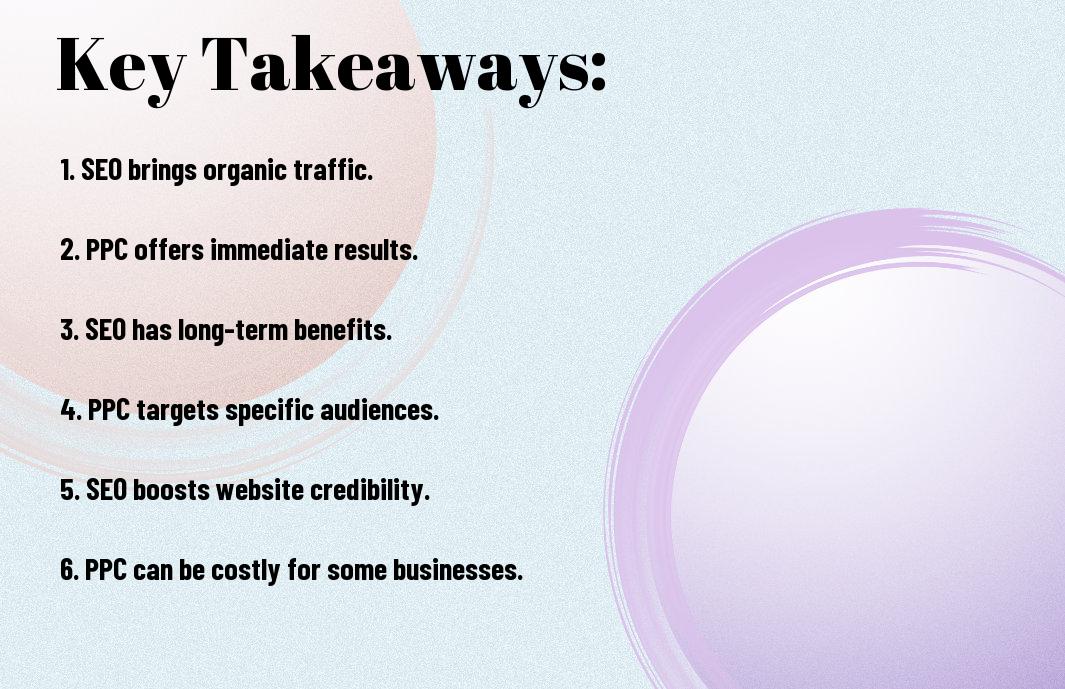Many businesses face the ongoing dilemma of choosing between SEO (Search Engine Optimization) and PPC (Pay-Per-Click advertising) to drive traffic and increase sales. Both channels offer unique advantages and challenges. To make informed decisions, it is crucial to understand the strengths and weaknesses of each strategy. In this blog post, we will research into the key differences between SEO and PPC, examining which channel has the potential to generate more sales for your business.
Key Takeaways:
- SEO is great for long-term, sustainable results as it helps improve organic search rankings over time.
- PPC can generate immediate results by driving targeted traffic to your website through paid ads.
- Combining SEO and PPC can create a powerful marketing strategy to maximize sales and reach a wider audience.

SEO – An Overview
How SEO Works
Some business owners may wonder how SEO works to improve their online visibility and drive sales. To put it simply, SEO involves optimizing your website and its content to rank higher on search engine results pages (SERPs). This is achieved through various techniques such as keyword research, content optimization, and link building. By implementing these strategies, businesses can increase their organic traffic and attract more qualified leads.
Benefits of SEO for Sales
An effective SEO strategy can significantly impact the sales of a business. By appearing higher in search engine results, businesses can increase their visibility and attract more potential customers. Additionally, SEO helps build credibility and trust with consumers, leading to more conversions and repeat purchases. Investing in SEO can provide long-term benefits for sales growth and establishing a strong online presence.
With the right SEO tactics in place, businesses can experience a continuous flow of organic traffic and generate quality leads without having to pay for advertising. This can result in a higher ROI compared to paid channels like PPC, making SEO a valuable long-term investment for driving sales.
PPC – An Overview
How PPC Works
Overview: Even though SEO plays a crucial role in digital marketing, PPC (Pay-Per-Click) advertising is equally important in driving sales. PPC works by allowing advertisers to bid on specific keywords in order to have their ads displayed to a target audience. When users click on these ads, the advertiser pays a fee, hence the name Pay-Per-Click.
Benefits of PPC for Sales
An Overview: Despite the rise of other digital marketing channels, PPC remains a highly effective way to generate sales quickly. With PPC, advertisers have more control over when and where their ads are displayed, allowing for greater visibility and targeted reach. PPC also offers real-time tracking and analytics, enabling advertisers to measure the success of their campaigns and make necessary adjustments.
Sales: One of the key benefits of PPC for sales is the instant visibility it provides to potential customers actively searching for products or services, which increases the likelihood of conversions. Moreover, PPC ads appear at the top of search engine results pages, giving advertisers prime real estate to showcase their offerings.

SEO vs. PPC – Comparative Analysis
After comparing SEO and PPC, it is vital to understand their unique strengths and how they can complement each other in a digital marketing strategy. For a detailed breakdown of when to use each channel, check out this insightful article on SEO vs. PPC: When to Use Which Search Marketing ….
| Cost Implications | Conversion Rates and ROI |
Cost Implications
Cost is a crucial factor when considering SEO and PPC. While SEO requires continuous efforts to improve organic rankings, it has a lower ongoing cost compared to PPC campaigns. On the other hand, PPC provides instant visibility but can incur high costs depending on the competitiveness of keywords and targeting.
Conversion Rates and ROI
To maximize your conversion rates and ROI, it’s important to analyze the performance of both SEO and PPC campaigns. Plus, PPC often delivers quicker results in terms of conversions since you can target specific audiences with tailored messaging. However, SEO can have a more sustainable impact in the long run by building authority and trust with your audience, leading to higher organic conversion rates over time.
Integrating SEO and PPC Strategies
Creating a Cohesive Marketing Plan
Your SEO and PPC strategies should work hand in hand to maximize results. By integrating your efforts, you can ensure a cohesive marketing plan that targets the right audience at the right time. This approach allows you to cover more ground in search engine results pages and increase your overall online visibility.
Measuring Success and Adjustments
An necessary aspect of integrating SEO and PPC strategies is regularly measuring their success and making adjustments as needed. Monitor key performance indicators such as click-through rates, conversion rates, and keyword rankings to evaluate the effectiveness of your campaigns. By analyzing this data, you can identify areas for improvement and make informed decisions to optimize your marketing efforts.
Strategies: It’s crucial to track the performance of your SEO and PPC campaigns closely to ensure they are driving results. Use tools like Google Analytics and Google Ads to measure metrics such as traffic, leads, and sales. Make data-driven decisions to continuously refine your strategies and align them with your business goals.

Final Words
Presently, the debate between SEO and PPC continues to be a prevalent discussion in digital marketing circles. While both channels have their strengths and can drive traffic to your website, when it comes to generating more sales, PPC has proven to be more effective. PPC allows for more control over targeting specific audiences, immediate results, and a higher likelihood of converting leads into customers. However, SEO plays a crucial role in establishing long-term visibility and credibility for your brand. The best approach is often a combination of both strategies to maximize your online presence and drive sales. Ultimately, the success of either channel depends on your specific business goals, target audience, and budget. It is important to continuously analyze and optimize your digital marketing efforts to ensure the highest possible return on investment.
FAQ
Q: What is the difference between SEO and PPC?
A: SEO (Search Engine Optimization) is the process of optimizing your website to improve its organic (unpaid) visibility on search engine results pages. PPC (Pay-Per-Click) is a form of online advertising where advertisers pay a fee each time their ad is clicked.
Q: Which channel, SEO or PPC, generates more sales?
A: The effectiveness of SEO vs. PPC in generating sales can vary based on various factors such as industry, target audience, budget, and business goals. However, in the long term, SEO tends to generate more sales as it helps in building organic traffic and credibility for your website. PPC can generate quicker results but requires ongoing investment to sustain sales.
Q: How can businesses decide whether to focus on SEO or PPC for sales generation?
A: It is recommended for businesses to have a balanced approach by incorporating both SEO and PPC in their digital marketing strategy. SEO is vital for long-term sustainable growth, while PPC can provide immediate results. Conducting a thorough analysis of your target audience, competition, and budget can help in determining the right mix of SEO and PPC for optimal sales generation.



